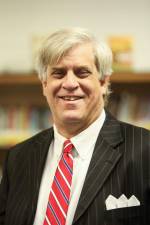Parents Association Hosts 'Meet and Greet' for BOE Candidates
West Milford. Residents had the opportunity to hear from the six Board of Education candidates during a forum sponsored by the West Milford Parents Association at the high school Monday night.

The West Milford Parents Association (WMPA) hosted a “Meet and Greet” event at the West Milford High School on Oct. 28 for residents to get to know the six 2019 Board of Education Candidates.
Three seats from the nine-member school board expire each year, with each trustee elected to serve a three-year term.
Incumbents Will Cytowicz and Steven Drew are seeking reelection, while Trustee Debbie O’Brien did not seek re-election due to family health concerns.
Challengers Michael Conklin Jr., Cortney Stephenson, Jaycen Stillman, and Robert (Bob) Woodier Jr. are the other four candidates.
"The West Milford Parents' Association (WMPA) has sponsored this meet and greet forum for the past two years because the organization believes the voters need this opportunity to hear the candidates first hand so they can make an informed decision at the polls," the organization said in a statement. "By listening to each candidate's platform and responses to issue related questions, voters can identify which candidate best represents the needs of the West Milford educational system."
Association Moderator Mary Moore presented the panel of candidates with four questions that were compiled from parent feedback, and presented to WMPA through each school’s Parent-Teacher Association (PTA/PTO/PTSO) representatives.
The order of responses from candidates for each question was random, and each candidate was held to time limits.
One of the big issues raised during the night, candidates were asked to state their position on the issue of moving sixth graders to Macopin Middle School by September, 2020.
All candidates said they were open to exploring the idea, but some voiced apprehension regarding the planned timing of the move.
Stephenson, Conklin, and Woodier all expressed concerns about rushing into the decision for September 2020 implementation.
Both Drew and Cytowicz strongly supported the move as planned.
Stillman said there are differing views and concerns among parents and students, and while many are against change in general, most agree the decision needs to be made based upon what is best for the students.
Stephenson said it is “a crucial decision that should be made carefully and efficiently."
She said she was proud that the administration created committees with community input for a data-driven decision; but said it is difficult for her to answer such a question without having all the data and facts available.
She listed issues of transportation, social/emotional, facilities, academic, master schedule, and fiscal, as an example of the many facets of the issue to be considered.
Stephenson said she would vote no if the move would not save the district any money or if it would cost the taxpayers extra; however, she would vote yes if the evidence shows that the move “would better prepare the students for an academically driven high school.”
“It is a not a decision that should be rushed," she said. "September of 2020 I think might be too soon.”
Stephenson said that she would like to hear the data from the various committees in January, and then further discussions should be had and planning done, such as having social workers prepare the students for the earlier age transition to middle school, addressing transportation changes and concerns, and giving teachers enough time to change certifications, since most are K-5 certified.
“We just need more time”, she said.
Conklin agreed.
“The district is heading in the right direction by creating various subcommittees studying the issues that are associated with this change," Conklin said. "It is my hope that all the committees have ample time to look at all aspects of this change.”
He said he has a great concern for implementing this for Sept 2020, and it could be “detrimental to students and staff, and the district as a whole” if it is rushed.
Woodier also agreed, acknowledging the certification standpoint made previously, and agreed with the need for “a data driven decision."
He said that the question is difficult to answer without having the data in hand, in order to make an educated decision.
He also said that the committees and board are expected to “come to a prudent decision, and at least show what the tangible results are to the community before making that decision. Because at the end of the day, it shouldn’t just be about saving tax dollars, it should be about providing a better education and more opportunities for our children”.
“If it’s not financially worth it, then no, I can’t support it," Stillman said. “Some kids are ready to go, some aren’t. Nobody likes change.”
He said many of the children that will be affected by the change are voicing concerns that they will not be having their traditional 6th grade graduation from their elementary schools.
To this, Stillman suggested that if the district moves forward with the plan this year, then “perhaps the schools could have a 5th and 6th grade graduation."
But he echoed his fellow candidates, stating that it is difficult to know how to answer the question without having data in front of him to show whether it is a feasible thing to do or not.
“If it isn’t feasible for our children, then I cannot support it," he said.
Drew stated that he is in favor of the move.
“Almost all of America does middle school as 6th, 7th and 8th grade,” he said.
He cited the educational value of utilizing “subject area certified teachers” for that grade level.
“With the strongest teachers in place for each subject, hopefully all kids will get a better education,” Drew said.
Cytowicz said he would vote yes, and gave the reason being that 6th grade students are struggling, particularly in math; according to district testing scores such as PARCC and HESAA.
“Sixth grade teachers are general teachers, as opposed to subject teachers; and by making 6th graders a part of Macopin Middle School, we would afford the opportunity of having subject-specific teachers teaching math, and teaching English, and teaching science; teachers who know specifically how to teach those subjects, particularly to struggling students,” Cytowicz said.
He said that while he understands the concerns of social/emotional impact of 6th graders moving to the middle school, “the overall benefits of the educational value is inherently there”, and “would better address the issues of those students who are facing more complex math issues and more complex literature.”
Candidates were also asked if they could foresee the closing of an elementary school as a possible solution to the loss in state funding.
“I am not for closing any of the schools,” Stillman said.
He said lower numbers in the classrooms allows for students to be able to get the one-on-one attention with the teacher that they need.
To address loss of funding, Stillman said that if the 6th grade is moved to Macopin as planned, open classrooms will be available space to use for more in-house programs for special needs students for services such as Speech and English learning classes, as well as possibly moving programs such as the one at Queen of Peace Church back into district-owned facilities, saving the expenses of rent and possibly other out of district tuition costs.
Conklin said the closing of a school would need to be significantly discussed as to how it would specifically impact students, and what the benefits would be.
“For any type of move that would close a school, would reroute staff, and more importantly students, a discussion needs to happen," he said. "Unless it would benefit the students, and the district as a whole, it isn’t something I would consider until reviewing all factors and discussing with all parties involved.”
Cytowicz said the issue of where to save money is best for the administrators and hired professionals to bring to the table for board consideration as to where cuts should/can be made.
While trustees can suggest options for alternate financing opportunities, and share ideas, it is ultimately in the best interest of the school district to let the professionals that are paid to do that job make the recommendations to the board for consideration.
As for closing a school, Cytowicz said the school board recently had an enrollment study completed, which stated that enrollment in the district will continue to decrease.
“That doesn’t mean that enrollment may not go up in time, which would mean that we’d need a school back,” he said.
He also said the Hillcrest building may finally have a resolution, and “We don’t want that again.”
Despite knowing his statement would be unpopular, Cytowicz said it is a "possibility" that an elementary school building could be closed and repurposed, but he would need more data.
He said that the enrollment and demographic study the school board had completed recently, also had a utilization study proposed as well; and “there’s a lot of data points – too many," he said, to be addressed at the present event.
Stephenson agreed with Cytowicz on the point that the district’s top administrators are responsible for creating the budget, and also where money will need to be cut.
“I am not, would absolutely not, be in favor of closing a school,” she said. “Closing a school would be disruptive for our children, our community and staff; I absolutely cannot imagine if my child’s school was closed.”
She said closing a school does not solve problems, and will lead to more problems.
Woodier’s response to closing a school was, “a firm no.”
“Because there are other things we can do as a district to up enrollment,” He said.
He said he believes the township will continue to see an influx of new residents with children coming in.
He also suggested the idea of hosting a program for foreign exchange students similar to one he said is in place in Pequannock.
Woodier also proposed looking further into energy savings through solar over parking lots, increasing STEM and Special Education program offerings in the schools to possibly gain back students attending out of district schools; and renting out open classroom space for preschool programs.
Drew commented on the significant cuts to State funding of $1 million last year, $2 million this year, and in five years, up to $7 million; stating that the district could implement the maximum allowed tax increase of 2 percent each year, “and all that will pay for is the loss of state funding.”
He said in addition to that, the district has schedule contractual raises or employees, facilities maintenance and repairs, and more.
“Reality is, we don’t have the money,” he said.
Drew said a goal would be to attract new families to the township and school district.
“I think the most important thing to do that is to improve academics." he said.
Drew also elaborated on the special challenges the district faces with the lack of ability for growth, due to the Highlands Act.
“I think it’s gonna take acute financial management to do this. And closing a school- I don’t think nine people should make that decision for the community," he said. "I personally think that, that should be a referendum- not just whoever we have on the board at that time.”
“The candidates up here are all good people. They are your friends and neighbors. They are doing this because they want to help. We (as school board trustees) receive no compensation at all. To be perfectly honest, you can’t make a bad choice; these are good people.” – Board of Education member and candidate Steven Drew.
